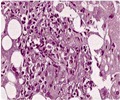Experts may have solved the mystery of why dengue fever, unlike other infections, is usually more severe the second time around. Dengue is a debilitating, sometimes fatal illness endemic to much of the tropics. Caused by a virus, it is characterized by high fever, bone and muscle pain and -- in the most serious cases -- hemorrhage and fatal shock.
Dengue is also unusual in that symptoms are more severe during a second or third infection compared to first-time infection.Experts estimate that over 50 million people are affected by dengue each year, with about five percent of patients dying of the illness.
The scientists evaluated the immune cell response of 73 Thai children hospitalized with dengue fever and found that all but two had been infected at least once before.
What's more, these children had relatively low levels of infection-fighting T cells specific for the new virus. Normally infection with viruses such as hepatitis C or Epstein-Barr result in high levels of such T cells. The researchers think a second infection triggers the immune system to frantically hunt for the wrong subtype of the virus, causing painful inflammatory symptoms such as aching and fever.
However, this second immune response generates immune cells that only react weakly to the new virus. And the duration of the disease is also much longer because the body fails to clear the infection quickly.
The discovery could hamper efforts to find an effective dengue vaccine. The risk, is that if the vaccine does not "hit" all four types of the virus, the vaccine may end up mimicking a second natural infection. For example, the vaccine may "prime" the immune system to attack only one or two types, leaving the patient with increased susceptibility to other types.
According to researchers, this danger was first identified after the development in the 1960s of a vaccine to the common respiratory syncytial virus "that made the natural disease worse." After vaccination with a harmless, inactivated form of the virus, children who were subsequently infected with respiratory syncytial virus -- the leading cause of lower respiratory tract infections in children -- suffered more severe lung symptoms than did unvaccinated children.











